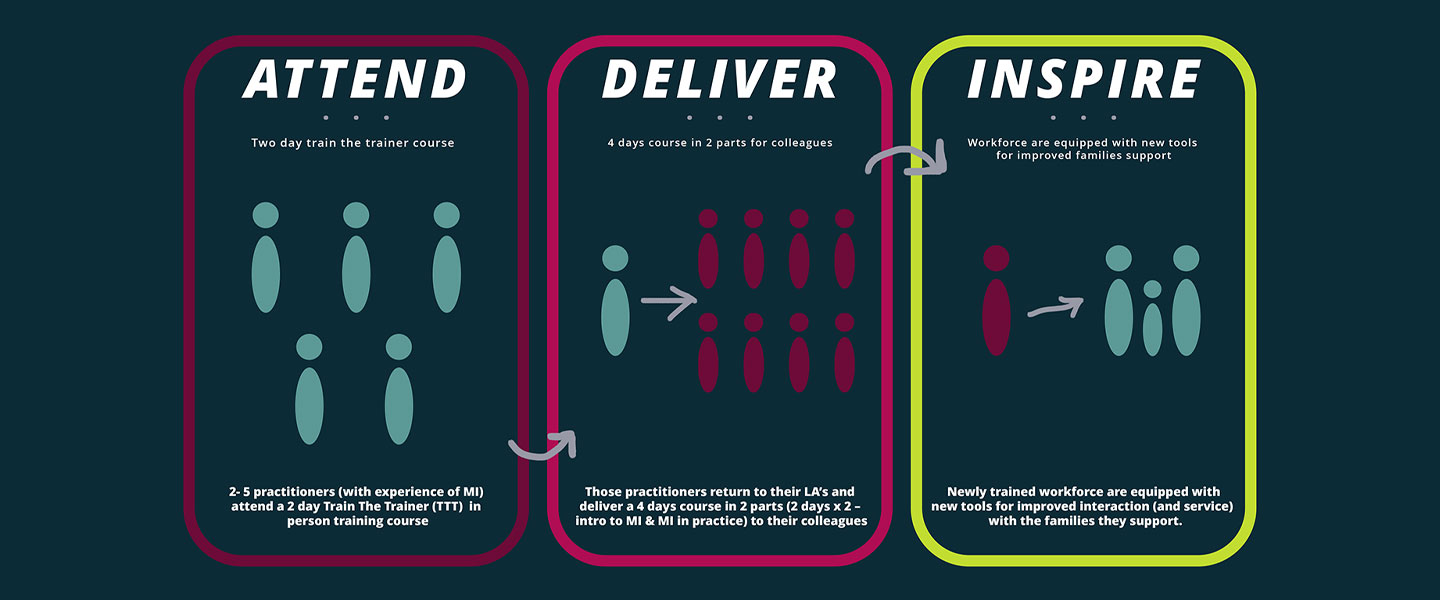
About
Professor Donald Forrester, Dr David Wilkins and their team in the CASCADE Centre at Cardiff University have carried out more research on MI and child and family work than any other group in the world. This has included exploring how to use MI for working with resistant parents, using it to have very difficult child protection conversations and adapting our understanding of MI so that it is a better fit for children’s services. This knowledge and experience has shaped the development of the training and the supporting materials, so that they provide an in-depth introduction to the use of MI for participating Local authorities.

Professor Donald Forrester
Director of the CASCADE Centre for Children's Social Care Research and Development
Donald’s first degree was in Psychology, however he spent much of his time doing voluntary work with children and young people. A feeling that psychology was too individualistic led him to follow a career in social work, and he qualified in 1992. He worked in Southwark in frontline child protection until 1999, when unanswered questions about how to do the work led him into research. Stints at Sussex, Goldsmiths and Brunel culminated in him becoming a Professor at Bedfordshire until 2016 when he came to Cardiff University to head up the new CASCADE Centre for Children's Social Care Research and Development - a job he absolutely loves!

David Wilkins
Assistant Director of the CASCADE Centre for Children’s Social Care Research and Development
Dr David Wilkins is a Reader in Social Work, and a tutor and lecturer for the MA Social Work programme. His main research interests are supervision for child and family social work, and social work judgement and decision-making.

Evidence to Impact
Evidence to Impact is a university social enterprise which works with academics to disseminate their successful social science research. They are collaborating with the CASCADE Centre to increase the reach of MI CASCADE training and will take the lead on organising the training, licensing the programme and invoicing as well as all matters in relation to the website.
MI CASCADE
MI CASCADE is an evidence-based intervention which has been created for social workers by social workers. It is based on years of research into the benefits of Motivational Interviewing (MI) strategies and techniques, and how they can be used in children and families work. The aim is to allow social workers to have better engagement and deeper conversations with their clients – all with the expectation of better outcomes for vulnerable families.
What is Motivational Interviewing?
Motivational Interviewing (MI) provides a set of principles and skills that allow for better engagement, deeper conversations and more purposeful practice in child and family work. It is a key element of important recent innovations with a strong evidence base, such as the Family Safeguarding model and Family Drug and Alcohol Courts. MI skills are associated with positive outcomes for families.
MI emphasises high quality listening, understanding the motivations of others and developing dialogue about difficult issues. It has been found to be effective with a wide variety of problem behaviours, from alcohol and drug problems to changing diet; in a diverse range of settings, from prisons to GP consultations; and for interventions that range from 6 minutes to many months.
The lead academics have conducted several studies applying Motivational Interviewing to child and family social work. They currently lead a major infrastructure award of £3 million from Health and Care Research Wales which includes CASCADE, the Centre for Trials Research at the University of Cardiff. The MI CASCADE intervention incorporates new research approaches for children's social care, enhance the involvement of children and parents and increase sector engagement with and use of research.

Our Offer
We are offering an extremely cost-effective way to train social workers from any Local Authority in the UK to both use, and train others, in Motivational Interviewing strategies and techniques.
This includes:
A two-day Training the Trainers course for up to 5 people.
All materials to deliver the programme to all social workers and practitioners within the local authority.
Mentoring and coaching via 3 online seminars per annum with the lead researchers.
Annual refresher training for trainers.
Quality assurance collected, collated and analysed by us to support high quality delivery.
Publicity materials, including short videos to publicise the programme within the LA
Website
Helpdesk
Over the course of a three-year period we hope that every active social worker in a Local Authority region will have seen tangible benefits and improvements in outcomes as a result of this improvement in practice.
How much does MI CASCADE cost?
For early adopters, the total cost for a 3-year licence is £5000 plus VAT. This includes all materials and online seminars. Training (minus travel and accommodation) is also part of the package.

Training Overview
Training Programme
Our training programme aims to support local authorities (LAs) to develop MI skills across their child and family workforce, from early support through to court work. To do this we have developed two two-day training courses, with supporting materials:
- Introduction to MI
- MI for Child and Family Work
These courses are designed to allow LAs to roll out MI training across their LA. We do this by training practitioners experienced and competent in using MI to deliver training to any social worker within their own LAs.


Training the Trainers
Day 1
- The core skills and principles of MI, and how these can be applied in the context of child and family social work.
- Rights-based practice and purposeful dialogue.
- The complexities of using MI directly with children and young people.
Day 2
- Having difficult conversations about risk and harm to children, using MI skills and principles and,
- How the notion of rights-based practice can inform and underpin these and other conversations in which it may not be possible to find a collaborative agreement.
Benefits
Evidence-based training, delivered by experts in their field
Asset-based training enabling you to train your staff on an ongoing basis beyond the duration of the licence.
Improved conversations with children and families.
Minimal resources required.
Ongoing web and helpline support.



